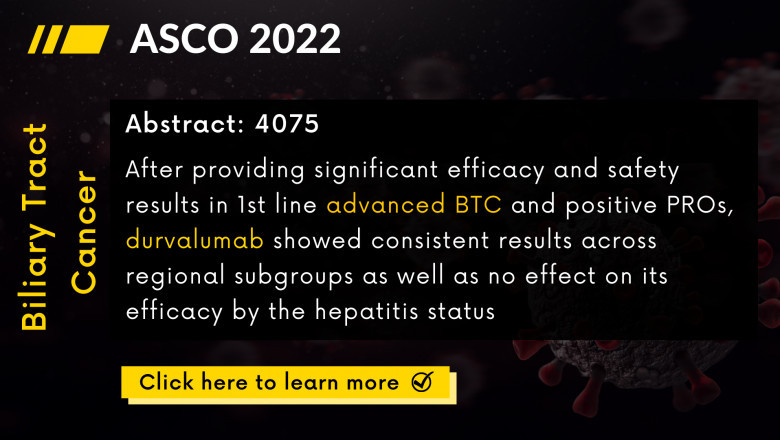views

TOPAZ-1 : Durvalumab Immunotherapy Highlights
Regional subgroup analysis of the Phase III TOPAZ-1 clinical trial of durvalumab (D) plus gemcitabine and cisplatin (GC) in advanced biliary tract cancer (BTC). (Abstract # 4075)
Durvalumab Mechanism of Action: Programmed cell death-1 ligand-1 inhibitors; T lymphocyte stimulants
In the pivotal Phase 3 TOPAZ-1 trial, a prespecified subgroup analysis was performed for efficacy outcomes, including OS for patients enrolled in Asia (China, Hong Kong, India, Japan, South Korea, Taiwan, Thailand) or the rest of the world (RoW; Europe [Bulgaria, France, Italy, Poland, Russia, Turkey, United Kingdom], North America [NA; USA], and South America [SA; Argentina, Chile]).
Patient numbers were balanced across regions (Asia, n=374 [54.6%]; RoW, n=311 [45.4%]). Baseline characteristics were balanced between regions except for modest differences in important pre-defined prognostic factors, including disease status: recurrent disease (Asia 23%; RoW 14.5%), ECOG performance status 1 (Asia 59.1%; RoW 41.2%), and metastatic disease (Asia 89.3%; RoW 82%) suggesting that the study was not adequately powered for the subgroup analyses
More pts in Asia received subsequent anti-cancer therapies in the Placebo arm than patients in RoW (53.6% vs 43.9%). The median duration of follow-up in censored patients was about 2 months longer in Asia versus RoW (14.8 vs 13.0 mo in D + GC; 13.8 vs 12.1 mo in PBO + GC). Regional level analysis showed outcomes were similar and approximated the overall population for Asia, Europe, and NA. Grade 3/4 adverse events were similar for Asia (D + GC 78.5%; PBO + GC 78.6%) and RoW (D + GC 72.7%; PBO + GC 76.7%).
Further results presented on the OS by viral hepatitis status also favored durvalumab + chemotherapy. The mOS for patients with or without hepatitis was 12.6 and 13.2 months, respectively. The placebo results for the same were 11.5 and 10.7, respectively, giving a 20-25% survival benefit to patients treated with durvalumab + chemotherapy arm.
KOL insights
We are hopeful that durvalumab plus gemcitabine and cisplatin will become a new standard of care for advanced BTC. Our first task at this time is boosting communication with patients and family members about the potential for this immunotherapy combination and what it may mean for their ongoing care” –Expert Opinion.
Conclusion
Despite some regional differences in prognostic characteristics, OS trends favored D + GC versus PBO + GC for patients enrolled in both Asia and RoW, supporting the use of D + GC as a potential new treatment option for all patients with advanced BTC.
Companies- AstraZeneca, Puma Biotechnology, Nordic Bioscience, Rafael Pharmaceuticals, Roche, Agios Pharmaceuticals, QED Therapeutics, Delcath Systems, Taiho Oncology, Merck Sharp & Dohme, Ipsen, BeiGene, Celgene, Eisai, Bristol-Myers Squibb, Bayer, Basilea Pharmaceutical.
Get in touch with our Business Expert @ Business Consulting Services | Biotech Consulting | Technical Due Diligence Firms
About ASCO 2022 Conference Updates
asco 2021 highlights | asco highlights 2021 | asco medical conference | asco 2021 | asco 2021 conference | when is asco 2021 | 2021 asco | 2021 asco annual meeting | asco convention | asco conference 2021 | asco 2021 | asco 21 | asco us | asco 2022 annual meeting | asco abstract 2022












